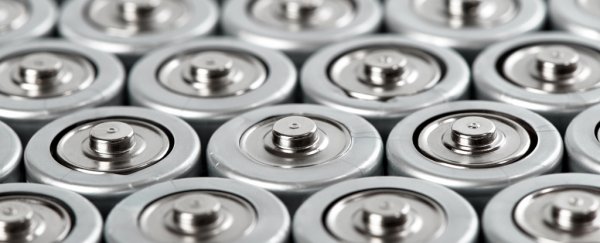From smartphones to electric cars, we're going to continue to need plenty of batteries in the years to come. New research shows how an upgraded type of aluminium battery could offer several advantages over the traditional lithium-ion ones in use today.
The battery has low production costs, and doesn't take the same environmental toll as the batteries we currently use, partly because it uses materials that are abundant and easy to find, reducing our reliance on ravaging the planet to power our electronics.
This new battery concept is particularly suitable for large-scale power systems – sites where power from renewable energy needs to be stored until it's ready, for example.
In contrast, not only is lithium scarce, but lithium-ion batteries often make use of cobalt too – and that's tricky and potentially dangerous to mine. The switch over to aluminium, if scientists can make it work, would have several benefits, not least by reducing our reliance on fossil fuels for battery production and recycling.
"The material costs and environmental impacts that we envisage from our new concept are much lower than what we see today, making them feasible for large-scale usage, such as solar cell parks, or storage of wind energy, for example," says physicist Patrik Johansson, from Chalmers University of Technology in Sweden.
"Additionally, our new battery concept has twice the energy density compared with the aluminium batteries that are 'state of the art' today."
Aluminium batteries aren't new, but in this case researchers swapped out the graphite usually used as the cathode, replacing it with the carbon-based molecule anthraquinone (the cathode absorbs electrons as the battery is used).
That helps achieve that higher energy density, making aluminium batteries a lot more practical, sustainable and commercially viable than they were before – though there's plenty of room for improvement yet in the internal chemical mix, particularly in the electrolyte that encourages ions to travel between the anode and cathode.
 (Yen Strandqvist/Chalmers University of Technology)
(Yen Strandqvist/Chalmers University of Technology)
"There remains work to do with the electrolyte, and with developing better charging mechanisms, but aluminium is in principle a significantly better charge carrier than lithium, since it is multivalent – which means every ion 'compensates' for several electrons," says Johansson.
For now this is only a proof of concept, and plenty more work needs to be done before we're running our homes on aluminium batteries. This study shows that the idea can work though, and if we're able to wean our electronics and power systems off lithium-ion, the benefits could be substantial.
The researchers suggest that aluminum batteries could soon be running alongside lithium-ion batteries in certain scenarios, with systems able to switch between the two depending on energy demands and specific use cases.
"Because the new cathode material makes it possible to use a more appropriate charge-carrier, the batteries can make better usage of aluminium's potential," says physicist Niklas Lindahl, from Chalmers University of Technology.
"Now, we are continuing the work by looking for an even better electrolyte."
The research has been published in Energy Storage Materials.
